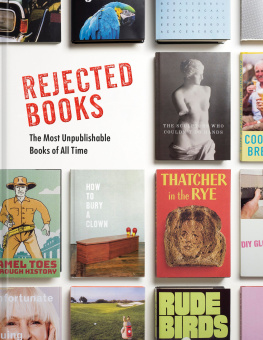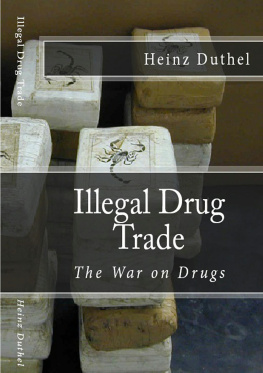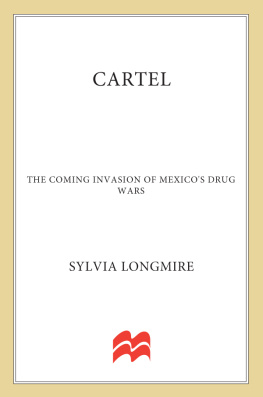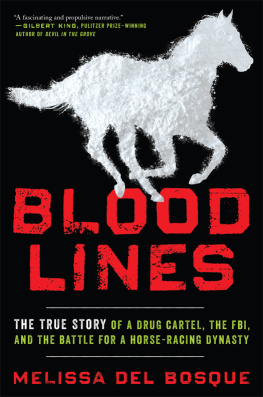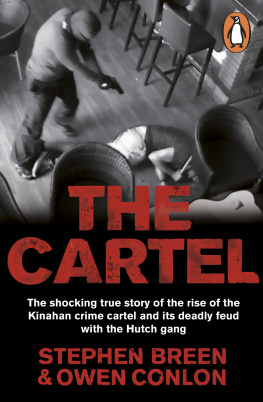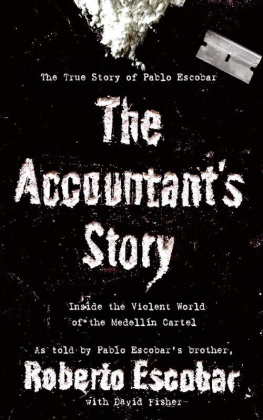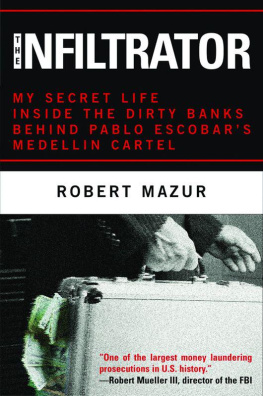CONTENTS
Also by Graham Johnson
Powder Wars
Druglord
Football and Gangsters
The Devil
Gang War (originally published as Soljas)
Darkness Descending
Hack
THE CARTEL
The Inside Story of Britains Biggest Drugs Gang
Graham Johnson

To Lenny and Norma, Emma, Sonny, Raya, Connie and Clara
ACKNOWLEDGEMENTS
A big thanks to Jon Elek at AP Watt, and to Bill Campbell and all at Mainstream Publishing.
I would also like to thank all of the interviewees for the information they have provided, particularly the policeman known as the Analyst. I would also like to thank the sources known as Poncho and Hector.
I sourced information mainly from interviews and research. However, to get what I felt to be the truth of a lot of things, I reviewed four of Peter Stockleys books: The Little Man Who Always Had a Busy Day, The Reluctant Vigilante, Extenuating Circumstances and The Rat They Called a Dog. I would like to thank Peter Stockley for helping me co-write several chapters of this book. I feel that Mr Stockley has, in his own words, helped draw back the blinds on an otherwise obscure period and its happenings. Sections of The Rat They Called a Dog have been copied with Mr Stockleys permission. Mr Stockley refused to name anyone in connection with these events and their identifications have been made by the author from his own research.
I also read The Belly of the Beast by Dylan Porter. Dylan Porter refused to identify or name anyone connected with his crimes and this information was pieced together by the author from newspaper cuttings and additional research. Shaun Smith also refused to identify anyone connected to him, particularly those who were involved in attacks on premises he was connected to, and their identities were made by the author and not Shaun Smith.
I have used information published in the Liverpool Echo.
CHAPTER 1
THE BIG BANG
1973
ON A COLD winters morning in 1974, the richest crime group Britain has ever known was founded in a rain-lashed lorry depot by a man named Fred. The story began with a heavily loaded BMC flatbed truck turning sharply into a disused cargo bay. The freight, stacked unusually high, swayed gently as the wheels creaked over the potholes, but luckily the crates didnt topple. Just like the men who were waiting for it, the rigid-base 7.5-tonner had wide sideboards.
The smell of hot rubber and diesel fumes hung thick in the air. Droplets of damp sizzled off the hot engine, adding to the sense of urgency that animated a small group of tough-looking men huddled in the gloom. One donkey-jacketed warehouseman got busy closing the main gates, to screen off unwanted onlookers. Two others went off to keep dixie on the reed-lined approach roads, making sure that the transport hadnt been followed. A fourth man warmed his hands near the spitting radiator grill before telling the terrified driver to fuck off to the pub for an hour.
No problem, boss, the haulier replied, mindful not to ask questions and glad to be out of the dark storm rolling in off the Atlantic.
The cab hadnt even had time to cool down before the owner was busy scrambling onto the trailer behind, impatient to recover his riches. Fred lifted back the green tarpaulin, sending rivulets of rainwater carelessly splashing back onto sacks of foodstuff. But he placed little value on the lorrys legitimate load. Fred pulled away more sacks to reveal a parcel that had been hidden among the wagons cargo of coffee and tinned fruit.
The heavy wooden cases were pushed off the side clumsily there was no forklift and no time then dragged across the loose coal that littered the yards weed-cracked concrete. The adjacent warehouse, constructed of great flaps of asbestos tiles, had a leaking roof and a pigeon problem. Rays of winter sunlight streamed through the holes and cracks in the tiles; they were the only source of illumination. Decrepit though it was, the structure at least offered some shelter from the elements, and from prying eyes, too, if only for a few minutes, while the graft was carried out. Since the decline of Liverpools Empire-linked sea trade, this outpost of the distribution yard had been little used. But the area was still well known to the corrupt dockers and their relatives who smuggled stolen goods out of the port regularly. Isolated by surrounding waste ground, the facility was ideal for transferring the contraband that would later revolutionise the fortunes of their dying city.
Fred was incongruously well dressed for the task, sporting high-waisted dark-red flares and brown, spoon-shaped shoes. But he ignored the splashes of mud and oil on his threads, manhandling the cargo roughly until hed reached the shadowy innards of the covered area. Brainwashed by and high on avarice, Fred was experiencing the adrenalin rush of seeing a parcel land, or get home as the process later became known. It was a feeling that would become familiar to the many who followed in his trail, a buzz so addictive, it was claimed, that men would risk long sentences just to be in on it: even more addictive, some boasted, than the stock-in-trade itself.
Feverishly, Fred jemmied open the lids of the crates with a crowbar, revealing a sickly sweet-smelling dark mush wrapped in stained muslin bags and layered crudely in crinkly coloured plastic. Heroin three kilos worth.
A celebration was in order this was the first consignment of Class A drugs that Fred had successfully smuggled through Liverpool docks. Fred headed for one of the nightclubs he owned in the city centre, took off his dripping sheepskin coat and drank to the future of his new venture. Thirty years later, the Cartel that he had inadvertently founded in a grimy post-industrial goods yard had a turnover of billions, employed thousands of people across the world and boasted of a hierarchical structure similar to that of a global corporation.
But the success was no accident on Freds part. His character was ideally suited to his new job. By day, he was a commercial burglar turned wholesale fence, buying and selling stolen lorryloads of consumer items. By night, he was a pioneering drugs trafficker. On the one side, he was a meat-and-two-veg gangster known on the street for fucking his underworld rivals betraying them on transactions and bumping them for money. His double-dealing had even earned him the moniker Fred the Rat.
Because at the end of the day, a contemporary called Paul Burly revealed, he was a rat.
Around that time, I was sent to jail, and when I was inside, Fred kind of took over a nightclub of mine and he stripped all the equipment from it the kitchen, the big steel ovens and work surfaces, the fridge etc. When I got out, I went to see him and took 27,000 back off him, as compensation. I just walked into his place and took however much was there, in cash.
Fred couldnt see what he had done wrong. He couldnt fight me either, so there was nothing he could do. But at the same time, he wasnt that bothered. 27,000 was a lot of money back then, but it wasnt a lot of money to him.
On the other hand, Fred was a shrewd and forward-looking villain. In his new profession, Fred wasnt interested in being a Mr Nice. Pleasantries were for your Oxbridge international playboys. Fred poured scorn on the privateers, flakes and hippies that had hitherto dominated Britains fledgling drug economy. Freds ambition was to rationalise the piecemeal drugs trade. On the supply side, he hoped to smuggle in loads of tens, and, if possible, hundreds, of kilos in regular, controllable patterns as opposed to the small amounts of variable quality muled in by opportunists. On the demand side, Fred wanted to take drugs out of the cult scene and into the mainstream market the housing estates and new towns that made up Merseysides bomb-cratered post-war topography.
Next page



